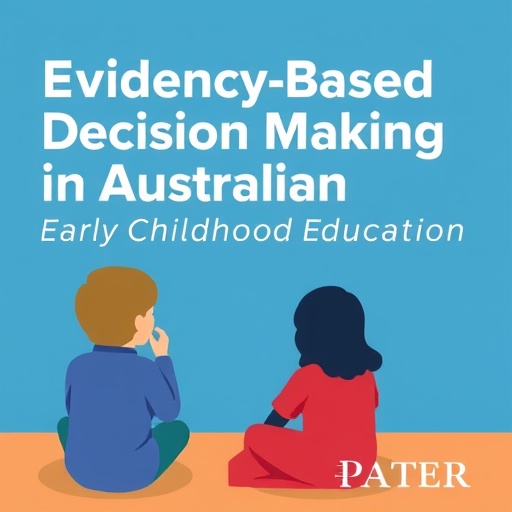In a significant exploration of the intersection between educational practices and empirical research, the study conducted by Levickis, Murray, and Lee-Pang delves into how educators in Australian early childhood education and care settings leverage evidence to guide their decision-making processes. This qualitative interview study unravels the nuanced ways in which educators interact with research, translating theoretical insights into practical applications that can significantly shape the learning and development of young children.
The findings illuminate a complex landscape where educators navigate a myriad of sources to inform their pedagogical approaches. The study highlights that diverse forms of evidence—ranging from academic research to anecdotal experiences—impact educators’ choices in curriculum development, instructional strategies, and classroom management. Educators often report a keen awareness of the importance of utilizing evidence, yet they simultaneously face challenges in effectively translating this knowledge into practice. The confluence of personal experience, institutional frameworks, and the socio-cultural context plays a critical role in shaping how evidence is interpreted and applied.
One of the most compelling aspects revealed by the study is the educators’ commitment to professional development as a means to enhance their understanding of evidence-based practices. Continuous learning opportunities, whether through workshops, conferences, or collaborative work with colleagues, are seen as essential for keeping educators informed about current research findings and pedagogical innovations. This desire for knowledge reflects a broader trend within the field of education, emphasizing the need for ongoing professional learning to adapt to changing educational landscapes.
However, the study also uncovers barriers that challenge the effective use of evidence in decision-making. Many educators express frustration regarding the accessibility and clarity of research. Empirical studies are often laden with jargon and complex methodologies that may not be user-friendly for those without specialized training in research. As such, educators may find it challenging to discern which evidence is relevant to their specific contexts. This gulf between research and practice underscores the importance of creating more digestible formats for disseminating findings to practitioners.
Additionally, the role of institutional support cannot be overstated. The study found that early childhood education and care settings that foster a culture of inquiry and provide resources for evidence-based practice are more likely to see educators integrating research findings into their daily routines. Support from leadership, including access to research summaries and time for reflection on practice, empowers educators to utilize evidence more effectively. This systemic approach illustrates the need for a cohesive strategy that aligns institutional policies with educators’ professional growth.
Collaboration with families and communities also emerged as a significant theme in the study. Educators articulated the importance of fostering relationships with parents and caregivers, recognizing that these connections can provide valuable insights and additional layers of evidence for decision-making. By involving families in the educational process and seeking their input, educators can better align their practices with the unique needs and values of the children and communities they serve. This partnership strengthens the collective commitment to evidence-based practices and enhances the overall educational experience for young learners.
The role of advocacy in promoting evidence-based decision-making cannot be overlooked either. Educators expressed a desire to advocate for more research-informed policies at the state and national levels. Many felt that their voices were often overshadowed in broader discussions about early childhood education policy. By engaging in advocacy efforts, educators can not only influence change within their settings but also contribute to shaping the national narrative around early childhood education. This active participation can lead to a more informed discourse that prioritizes the needs and perspectives of those directly engaged in teaching young children.
In terms of practical implications, the study presents a compelling case for developing frameworks that support educators in their quest to apply evidence-based practices in their classrooms. Creating user-friendly resources that synthesize research findings into actionable strategies is essential. Professional learning communities can serve as platforms for educators to share experiences, challenges, and successful practices, fostering a collaborative ethos that values evidence in pedagogical decision-making.
Furthermore, the findings point to the necessity of ongoing conversations about relevance and the context of research. Educators must not only understand the evidence but also critically assess its applicability to their unique classroom settings. This reflective practice encourages educators to become more discerning consumers of research, enabling them to advocate for approaches that best meet the diverse needs of the children they teach.
In conclusion, the research conducted by Levickis and colleagues opens important discussions on the dynamic interplay between evidence and practice in early childhood education. It emphasizes the vital role that educators play in making decisions informed by evidence, while also highlighting the systemic challenges they face. As stakeholders in education work towards fostering a more research-informed landscape, the insights from this study can guide efforts to create supportive environments that empower educators and ultimately enhance the quality of early childhood education and care.
This study acts as a call to action, urging educators, researchers, policymakers, and institutions to engage collaboratively in dialogues that bridge the gap between evidence and practice. By prioritizing evidence-based decision-making, the field of early childhood education can continue to evolve, driven by a commitment to providing the best possible start for young learners.
Subject of Research: Use of Evidence in Decision-Making in Early Childhood Education
Article Title: How do Educators Use Evidence to Inform Decision-Making in Australian Early Childhood Education and Care Settings? A Qualitative Interview Study
Article References: Levickis, P., Murray, L., Lee-Pang, L. et al. How do Educators Use Evidence to Inform Decision-Making in Australian Early Childhood Education and Care Settings? A Qualitative Interview Study. IJEC (2025). https://doi.org/10.1007/s13158-025-00422-8
Image Credits: AI Generated
DOI:
Keywords: Evidence-Based Practices, Early Childhood Education, Decision-Making, Qualitative Study, Professional Development




